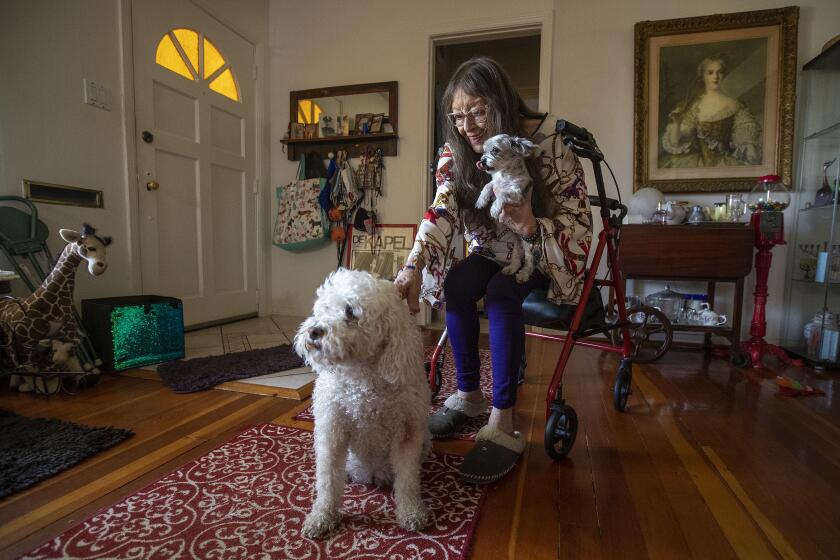Opinion: Does working from home make you lonely? Here’s one fix that won’t have you returning to the office

One pair of jeans. Those were the only pants my cousin brought when he came to stay with my family for a summer in the early 2000s. He had moved several times in his young life and had clearly learned to live frugally. I was excited about his visit as I watched him unpack.
Zach wasn’t the only visitor my parents housed when I was young. They also opened our home periodically to two missionaries with a group that provides refuge for Roma children. I distinctly remember a visit when they taught us the card game Golf. It was a challenging game and normally it would have frustrated me, but with them I laughed, probably because I knew they wouldn’t be around forever. I dreaded guests’ departures and would long for another person who lived what I thought of as a daring life to interrupt my seemingly normal one. Now, as an adult, I work from home, the majority of my days spent in quiet solitude.
A 2022 survey noted that 70% of remote workers don’t feel they’re able to socialize enough, and close to half said they are likely to leave their jobs because of loneliness. Reinforcing this sentiment, about 25% of people globally experience regular feelings of seclusion.
Diane passed away in December. Now I wander our home’s empty spaces at night like a character in a Gothic horror novel.
One prescription for this modern epidemic is opening one’s door to guests. While some do this to earn extra income, others simply enjoy practicing hospitality and inviting interesting experiences with strangers and friends alike. Even Airbnb hosts are increasingly offering private rooms and more renters are choosing this option.
My aunt, who owns a beach house in Tybee Island, Ga., has repeatedly suggested I work from there. While I visit annually, it’s always for time away from work. Regardless of her guests’ reasons for coming, she says the real benefits of hosting are the relationships she forms by doing so.
In a study of the intimacy that can form between strangers who share housing, sociologist Maria Törnqvist found that residents of the same home, whether temporary or permanent, check in with each other organically. She describes housemate interactions as “elastic,” with deep conversations often occurring when at least one person is in the middle of a task, such as preparing dinner or doing laundry. An “intimate ambiance” naturally develops. Simply put, sharing a home can evoke excitement in otherwise monotonous situations.
Assuming that a return to the office will address the supposed shortcomings of remote work is a way of avoiding longstanding organizational problems.
This is reflected by the popularity of the Couchsurfing app, a platform with 14 million members offering complimentary stays in hopes that travelers will connect with different people on their journeys, creating unique social encounters for hosts and guests. In addition to offering a place to stay, some hosts offer to share local experiences, such as a vegetarian tour of “meats” made of tofu in Prague, surfing in Costa Rica and tending an organic farm cooperative in Portugal.
While opening up one’s home creates opportunities to form new relationships, it is important to establish boundaries. It can take time for hosts to learn what works best for them. Just after my aunt bought her beach house, she welcomed guests back to back. But she soon realized that she and her family needed periods of time to themselves and began making sure they kept their visitors at least two weeks apart. She established another rule after one stay: No Cheetos in the bedroom.
Routinely providing living space for others causes instinctive physiological reactions for hosts, including increased adrenaline levels stemming from the excitement and the uncertainty a cohabitant brings. This hormone influx can last the length of the stay, escalating anxiety, Nicholette Leanza, a therapist, told me. One should be prepared to handle the occasional bad experience. Maya Manseau, a grief guide who works from home, regularly invites others to stay with her. She had one situation go poorly and ultimately asked her guests to leave. Despite this instance she continues to open her doors, with arrangements extending from a few weeks to years.
Adult centers run by Valley InterCommunity Council offer support for those in isolation. ‘If you know anybody that’s old like me, and, you know, needs a friend, I would love that’
Evidence shows that being generous makes people happier, improves psychological health and can lengthen lifespans. This can be a small act, such as complimenting a stranger, or something more intense such as volunteering time, space or money. And because we learned during the pandemic that face-to-face communication is better for our mental stability than digital connections, it stands to reason that altruistic acts have a greater impact on the brain when done in person.
Those interested in trying out an “open-door policy” can connect with potential guests through Couchsurfing, a local church or nonprofit, or by putting the word out to family and friends. Airbnb also allows offers of free, temporary, emergency lodging in times of crisis, and those using the vacation rental platform Vrbo can set a very low rate and refund guests later. Taking money out of the equation promotes mutual psychological benefits, but it’s safest to begin with guests who are vetted by an app or recommended by someone you trust.
I recently bought a house with three bedrooms. One will serve as a designated office for my remote job, another is where I will sleep and the third, well, I can’t wait to see what guests will inhabit it and hear the stories they will share.
Natalie Bickel is a writer based in Indiana.
More to Read
A cure for the common opinion
Get thought-provoking perspectives with our weekly newsletter.
You may occasionally receive promotional content from the Los Angeles Times.













